I imagine a variety of impressions come to mind when people hear about the Democratic Republic of the Congo (DRC).
With increasing awareness of the violence and humanitarian crisis in eastern DRC, likely attributed to an uptake of social media coverage and hashtags such as #freecongo, images of conflict are impressed upon many.
For others, the rhythmic strum of an acoustic guitar alongside the swift tempo of percussion, or resonant sound of the Likembe, tempt the sway of hips, impressing the lure of Congolese rumba and other popular genres.
An impression that pleases the tongue is the variety of dishes featuring cassava leaves, smoked fish, palm oil, peppers, plantains, and fluffy beignets.
There is also the thought of the largest expanse of rainforests in Africa containing ripe mangoes, intelligent Bonobo apes, and the ever flow of great waterfalls.
All these images and more come to mind when I think about the place of my heritage. My parents emigrated from the capital city of Kinshasa in the 80s and 90s. They envisioned a future with plentiful opportunities and great education for their children. I’ve seen their sacrifices reap many blessings for my siblings and me, as we each enjoy the quality of life they dreamed for us.
I grew up as what some would call a “third culture kid,” meaning my upbringing was influenced by my parent’s Congolese origin in addition to the American communities I inhabited. The cultures and traditions I uphold are an amalgamation of these influences, and I find myself somewhere in the middle, not always quite sure where I fit. So, when I had the chance to visit the DRC for the first time in 2022, I was ecstatic. It was my first time meeting my Koko (grandma and grandpa) and larger family, who I had only seen through mailed photos and spoken to through phone calls and eventually WhatsApp video calls. My first trip was a short 10 days and I felt that I was in both a familiar and foreign place.
During this second visit, I am spending five weeks in Kinshasa completing my practicum with the Infectious Disease Epidemiology and Ecology Lab, within the UNC School of Medicine’s Institute for Global Health and Infectious Diseases. As an MPH candidate in Applied Epidemiology, I am supporting hepatitis B virus (HBV) prevention work in the DRC. I support a project that targets pregnant mothers and infants for care, a subgroup highly impacted by HBV and facing many barriers to accessing healthcare and medication. My role is to ensure data quality and completeness, develop reports on the significance of community health workers in this effort, and document effective strategies for patient retention and follow-up.
Working in-person has been invaluable as I get to strengthen my French-language skills, witness how pregnant mothers are educated on HBV at the clinic and celebrate with the local team when babies are reported as not having contracted HBV. The joys are balanced with difficulty as I recall the cries of an inconsolable mother who lost her child soon after birth, and the frustration of not being able to retrieve a mother for follow-up visits.
Joys balanced with challenges has been the theme of these past few weeks. Being here is complex, as I revel in the stories of how my mom sold fish at the market and helped care for her siblings, while disheartened by the apparent poverty and trash-filled canals. I’m encouraged by the efforts of Congolese artists and influencers highlighting the beauty of this grand country on social media platforms, while discouraged by the lack of Congolese-owned industries and exploitation of resources. I enjoy laughter with my colleagues, adding light to gray skies permeated by pollution during the dry season.
Being of Congolese origin but American nationality, I continue to wrestle with where I fit in while I am here. Just as I consider the many facets of what the DRC represents, I am learning to accept that I also represent many things. While I am here for just a few weeks, I choose the posture of serving a people and a place near to my heart through public health.
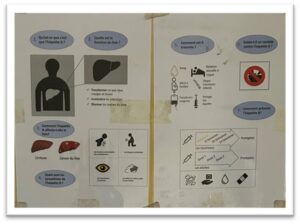
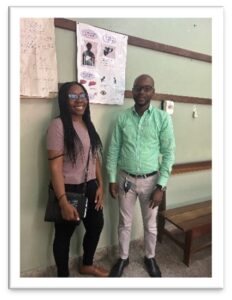
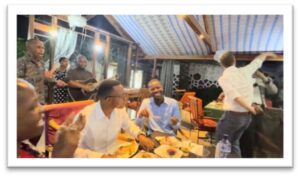
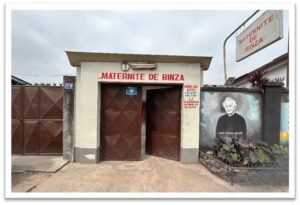
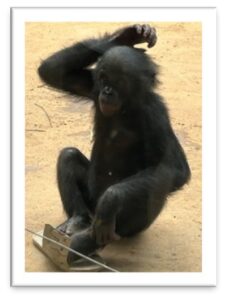
Nefer
